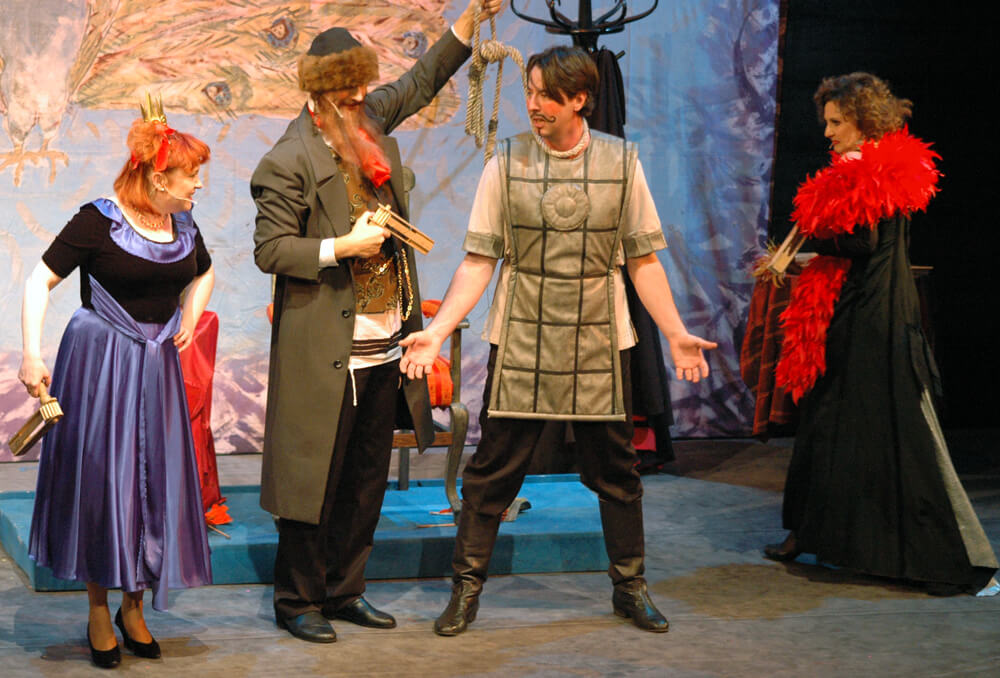A primary influence on Jewish jokes? The ancient Purim spiel
Purim spiels, like a roast, were always written in good fun and not with the intent to harm or demean

A Purim spiel performance in 2009 at the Jewish Theatre of Warsaw, Poland. Photo by Henryk Kotowski/Creative Commons
You know the saying, “All roads lead to Rome?” Well, I believe that the rich history of Jewish jokes can be traced back to the Hebrew month of Adar and the holiday of Purim. That’s right — we have finally arrived at the time of year specifically reserved for merriment and fun.
If you’re not familiar with the Purim story, let me give you the drive-thru version. The Purim story reads like the script of a new Netflix thriller. The evil Haman, royal advisor to King Ahasuerus, wants to kill all Jews in the land of Persia and convinces the king to issue a royal edict about it. Little does he know, the queen, herself a Jewess, is plotting with her uncle Mordechai to expose Haman and save the Jews. At the last minute, Esther succeeds and the holiday of Purim is born — the one day a year we are literally commanded to “eat, drink, and be merry.” No joke: It’s an edict from the rabbis. There are even detailed discussions among them about just how inebriated we can become.
The whole month surrounding the holiday, which this year begins at sunset on March 23 , is known as the happiest month on the Jewish calendar, one of good fortune, and one in which we specifically try to increase our joy. Indeed, the month is recorded in the Talmud as being specifically fortuitous for the Jewish people, and we are encouraged to do things like resolve court cases and complete big purchases we’ve been planning — like putting in an offer on a house.
One of the surefire ways to increase our joy? A good joke, of course!
In general, the sages of the Talmud looked down on live theater, as live Roman theater in the early centuries of the common era involved cruel treatment of human slaves and prisoners for the viewing “pleasure” of all who came to watch the spectacle.
But the rabbinic view relaxed on Purim, when we don costumes and increase our levity. Finally, many centuries later, we came up with our own form of theatrical comedy — the Purim spiel.
The origin of the Purim spiel
What is a Purim spiel exactly? Maybe you’ve heard the term, but you can’t quite articulate its meaning. Spiel (pronounced “sh-piel”) is actually a Yiddish word meaning play or skit.
The Purim spiel, sometimes spelled “shpiel,” began to take shape in the 16th century in medieval Europe. Though these performances first started out during the Purim meal among small groups of families, the popularity of the performance eventually made it a staple of the Purim celebrations of larger gatherings, such as within a synagogue or a town.
The Purim spiel has evolved into an opportunity to poke fun at the leaders of an institution, be it lay leaders or rabbinical leaders. Purim is the one day a year when students become the teachers, as they don costumes like long beards and tall hats to dress up like their rabbis.
In the last 100 years in America, the Purim spiel has become an accepted part of Jewish institutional culture. Purim spiels are sometimes short, stanza-like songs, or they can sometimes be longer, more elaborate plays and parodies.
As a kid growing up in Atlanta, I remember our synagogue’s annual Purim spiel as the one day a year I would see the adults in my synagogue belly-laughing, as other adults in the congregation imitated the rabbi or the cantor. Indeed, the funniest jokes would have the person being “roasted” laughing hard themselves, signaling to the room that Purim spiels were always written in good fun and not with the intent to harm or demean.
It’s possible that your synagogue is planning a Purim spiel this year, and if you happen to be in it or just watching one this year, take comfort in knowing that you are participating in a centuries-old tradition that is the beating heart of Jewish humor.























